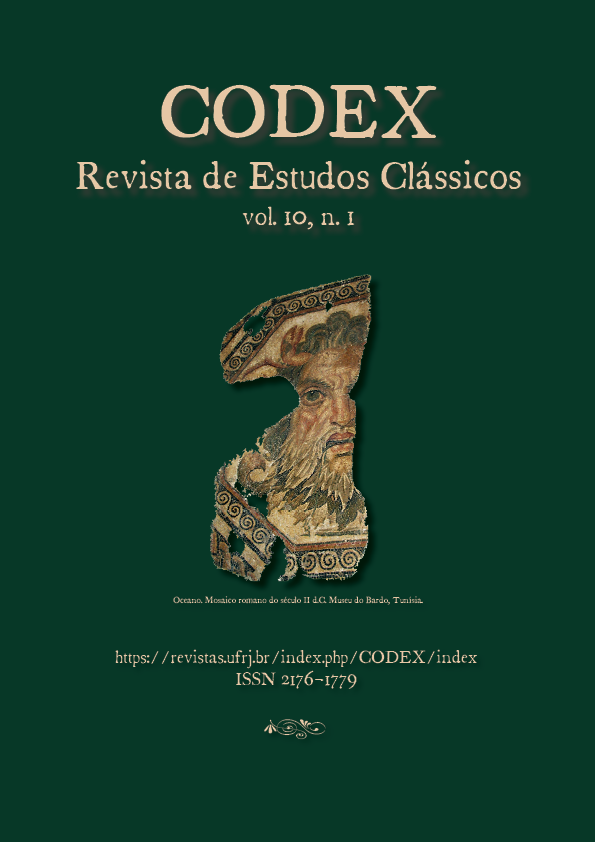Píndaro antes de Alexandria: a conexão aristotélica
DOI:
https://doi.org/10.25187/codex.v10i1.49218Keywords:
Píndaro, Aristóteles, epinícios, transmissão textual, Biblioteca de AlexandriaAbstract
Neste artigo, pretendo explorar um cenário admitidamente hipotético, porém bastante plausível, que envolve a participação de Aristóteles, através de seu trabalho filológico muito bem documentado nas fontes antigas, com autores da Antiguidade, na edição e posterior transmissão das obras de Píndaro para Alexandria. Baseando-me nas evidências disponíveis, acredito que seja possível argumentar que o filósofo, ajudado pela sua enorme coleção de livros, estava em uma boa posição para ter coletado, editado e produzido uma edição padrão das canções de Píndaro que puderam, após a sua morte e a dispersão de seu espólio, chegar às mãos dos bibliotecários em Alexandria. Em face de uma quase completa ausência de testemunhos acerca dos primeiros estágios de transmissão e fixação da obra de Píndaro, acredito que valha a pena tentar revisar as evidências que nos permitiriam reconstruir um cenário no qual Píndaro é primeiro editado em Atenas e, apenas mais tarde, chega em Alexandria, sobretudo porque uma tradição semelhante já foi proposta para os épicos homéricos.
References
ARAÚJO, A. A. D. 7a Ode Olímpica de Píndaro: Tradução e Notas. 2005. (Mestrado em Letras Clássicas). Universidade de São Paulo, São Paulo.
BARBANTANI, S. ‘Lyric in the Hellenistic period and beyond’. in: BUDELMANN, F. (ed.) The Cambridge Companion to Greek Lyric. Cambridge, 2009, p. 297-318.
BLUM, R.; WELLISCH, H. H. Kallimachos: The Alexandrian Library and the Origins of Bibliography. Wisconsin: University of Wisconsin Press, 2011.
CHRISTENSEN, P. Olympic victor lists and ancient Greek history. Cambridge: Cambridge University Press, 2007.
DICKEY, E. Ancient Greek Scholarship. Oxford: Oxford University Press, 2007.
EASTERLING, P. E.; KNOX, B. M. W., Eds. The Cambridge History of Classical Literature: Volume 1, Greek Literature, Part 1, Early Greek Poetry. Cambridge: Cambridge University Press, 1989.
ERBSE, H. Beiträge zur Überlieferung der Iliasscholien. Zetemata, n. 24, 1960, p. 17-77.
GOODING, D. W. Aristeas and Septuagint Origins: A Review of Recent Studies. Vetus Testamentum, v. 13, n. 4, 1963, p. 357-379.
HERINGTON, J. Poetry Into Drama: Early Tragedy and the Greek Poetic Tradition. Berkeley/ Los Angeles/ London: University of California Press, 1985.
HUBBARD, T. K. The dissemination of Epinician lyric: pan-hellenism, reperformance, written texts. In: MACKIE, C. J. (Ed.). Oral Performance and Its Context. Leiden: Brill, 2004. cap. 4, p. 71-94. (Mnemosyne Bibliotheca Classica Batava Supplementum).
IRIGOIN, J. Histoire du Texte de Pindare. Paris: Klincksieck, 1952.
KNOX, B. M. W. Books and readers in the Greek world. In: (Ed.). The Cambridge History of Classical Literature: Volume 1, Greek Literature, Part 1, Early Greek Poetry. Cambridge: Cambridge University Press, 1989, p. 1-15.
MACLEOD, R. M. The Library of Alexandria: centre of learning in the ancient world. London: I.B. Tauris, 2000.
MONTANARI, F. (ed.) La philologie grecque. Entretiens Hardt 40.Vandoeuvres–Geneva, 1994.
MOST, G. W. The Measures of Praise. Göttingen: 1985.
PFEIFFER, R. History of classical scholarship from 1300 to 1850. Cambridge: Clarendon Press, 1976.
PRAUSCELLO, L. Singing Alexandria: music between practice and textual transmission. Leiden: Brill, 2006.
RICHARDSON, N. J., Aristotle and Hellenistic Scholarship. In: MONTANARI, F. (ed.) La philologie grecque. Entretiens Hardt 40.Vandoeuvres–Geneva, 1994, p. 7-38.
SANDYS, J. E. A history of Classical Scholarship. Oxford: Oxford University Press, 1903.
SUSEMIHL, F. Geschichte der griechischen Litteratur in der Alexandrinerzeit. Berlin: B. G. Teubner, 1891.
WILAMOWITZ-MOELLENDORFF, U. Einleitung in die Griechische Tragödie. Berlin: Weidmannsche Buchhandlung, 1907.
WILAMOWITZ-MOELLENDORFF, U. Antigonos von Karystos. Berlin: Weidmann, 1965.
Downloads
Published
How to Cite
Issue
Section
License
This work is licensed under a Creative Commons Attribution-NonCommercial 4.0 International License.










